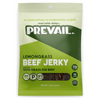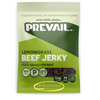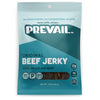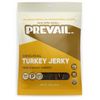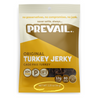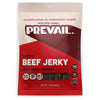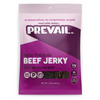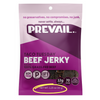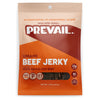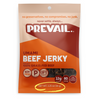Does Beef Jerky Go Bad?

There's no debate that jerky is the number one snack for many individuals. The reason for this is not far-fetched. Jerky comes in a variety of flavors, is nutritious, and lasts for a long period!
It's also the perfect snack for when you're on the go - portable, meaty, and satisfying. But what happens when you find an old packet of jerky at the bottom of your backpack? Is it still safe to eat? Let's find out.
Does Beef Jerky Spoil?
One thing you should note is that beef jerky does not go bad like let's say cheese or milk. Unlike perishable foods, jerky comes with a "best-by" date rather than an expiration date.
It's why beef jerky has been popular for hundreds of years. It's a nutrient-dense, high-protein snack that doesn't go bad and won't spoil like other perishable foods.
Jerky can be utilized for a long time if produced, packaged, and stored correctly. But that isn't to say that it is resistant to improper storage and handling. If jerky is not properly dehydrated or stored, it might cause mold and decay.
The good news is that it's easy to know when a bag of jerky has spoiled or gone bad. We will talk about how to know if a pack of jerky has gone bad later on in this article.
Why Does Beef Jerky Last So Long?
The simple answer is because it doesn't have enough moisture to support the growth of bacteria. Bacteria need water to grow, and jerky has very little water content thanks to its production methods. As a result, jerky can last for months without refrigeration - as long as it's stored in a cool, dry place.
Process Of Making Beef Jerky
As stated above, one of the reasons beef jerky lasts so long is its production methods. The jerky-making process begins with beef that has been trimmed of fat and cut into long, thin strips. The beef is then seasoned with some salt, and other spices before being placed in a dehydrator, smoked or oven set to low heat.
The beef strips are left in the dehydrator or oven until all the moisture has been removed and the beef is chewy and dry to the touch. Once the beef jerky is properly dehydrated, it can be stored at room temperature for several months.
When it comes to shelf-stable snacks, beef jerky is hard to beat. It's delicious, nutritious, and will last for months without refrigeration. However, it's important to note that beef jerky can go bad if it's not properly dehydrated or stored.
How To Tell If Beef Jerky Is Still Good?

To determine if beef jerky is still safe to eat, follow these three simple steps; check for the best-by date, check for any damage in the packaging, and inspect the jerky. We will discuss each of them individually.
Also remember that when evaluating a bag of jerky, it's critical to utilize all of your senses—sight, smell, and touch. Your eyes and nose will be your greatest guide.
Examine The Best-by Date
All beef jerky produced in the United States must have a best-before date on the package. It's usually near the bottom seal of the bag. This is a nice place to start if you're wondering whether or not beef jerky is still fresh. Remember, just because jerky has passed its expiration date does not imply it is unsafe to eat.
Check If The Packaging Is Damaged
It's possible that the bag has been opened, and if so, it might indicate that oxygen and moisture have gotten inside the package, possibly causing problems. It's not necessarily an indication that the jerky is rancid, but it's a caution flag to keep in mind.Examine the jerky
You can identify spoiled jerky by examining it carefully. How does it look? Take note of the color. Pay attention to any flaws. Does it have white spots? What about the scent? It should have a fresh, savory meat smell. How does it feel? It should be firm and flexible but not too hard or soft.
Mold and rancidity are the two most common indications of spoiled beef jerky. Is mold present in the jerky? White, green, or gray powdery or fuzzy foreign substances that are furry, fluffy, or fuzzy are all signs of mold. Also, a spider web pattern generally characterizes mold. If it resembles cobwebs, there's a good chance it's mold. It's also possible that the white substance might be fat or salt. So keep that in mind.
Is there a distinct odor to the jerky? Occasionally, beef jerky can go rancid when it contains slightly more fat. A foul smell is an indication that beef jerky has become rancid. If you find beef jerky with mold or signs of deterioration, trash it and avoid eating it because eating spoiled beef jerky can lead to food poisoning.
How Long Does Beef Jerky Last Once It's Opened?
The shelf life of beef jerky depends on the type. It will either last up to three days if unrefrigerated or indefinitely if it's a drier style jerky.
The long shelf life of beef jerky is due to the absence of two distinct elements: moisture and oxygen. Beef jerky may be kept for a long time if moisture is removed (through the drying process) and oxygen levels are reduced (by packaging in a sealed package).
However, once a box is opened, you expose it to moisture and oxygen. That's why any remaining jerky should be resealed in an airtight container to limit exposure to moisture and air as much as possible.
Beef jerky should last for a long time if properly sealed in an airtight plastic bag or container and kept in a cool, dry location.
How to Store Beef Jerky

Also, opened jerky that is vacuum-sealed is less susceptible to bacteria and stays fresher, longer. Here are some other ways to store your beef jerky:
Refrigerate Your Beef Jerky
Your jerky should be refrigerated after it's been opened. Beef jerky must stay cold to preserve its texture, flavor, and freshness after the seal is broken.
To keep your jerky fresh for a week or more, put it in a zip lock bag and squeeze out all of the air before chilling it.
Freeze Your Beef Jerky
If you don't intend to eat your beef jerky right away, freezing it is the way to go. If frozen correctly, beef jerky has a shelf life of up to seven months. Unopened bags or bags containing air should be placed in an airtight container in order to avoid freezer burn.
How Long Does Homemade Beef Jerky Last?

Commercial beef jerky must obey strict cooking and drying standards along with packaging requirements. Homemade jerky is totally safe to cook and consume, however, it won't last as long as commercial jerky.
If you're making your own beef jerky, trim off all of the fat prior to drying it to improve its shelf life. When meat spoils, fat is typically the first component to go rancid. When it does, the rot can spread and ruin the entire batch. The less fat you have, the less likely your jerky is to rot before its time.
Is Beef Jerky A Good Survival Food?
Beef jerky is good survival food because it doesn't require refrigeration, is high in protein and has a long shelf life. However, beef jerky is not the only food that you should include in your survival kit. You should also include other non-perishable foods such as canned goods, dried fruits and nuts, and powdered milk.
Where To Get The Best Beef Jerky

Here at Prevail, we don't load our jerky up with preservatives to give it longer shelf life, but we do everything else we can to guarantee your jerky will stay fresh for a long time. We use only high-quality ingredients, lean meat, and the best drying and packaging practices to keep out harmful moisture.
Each batch of jerky is heavily scrutinized to ensure quality and flavor in every bag. Satisfy your jerky cravings with the freshest, tastiest, highest-quality jerky around. Don't forget to take a look at all the flavors we have to offer and buy a few bags of Prevail's top-shelf jerky today!
Bottom Line
So, does beef jerky go bad? Yes, it can. However, if you store it properly and consume it before the expiration date, you will be fine. Just make sure to keep an eye out for any signs of spoilage, and you'll be good to go!
Also, whether it is a homemade beef jerky or commercial, if you want to extend the shelf life of beef jerky, store it in a cool and dry place, vacuum-seal it, or pack it in an airtight container. You can also freeze it to keep it fresh for longer. In all, make sure you carefully observe the shelf life of beef jerky to prevent eating an expired one.


